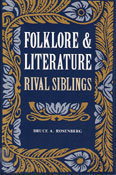Folklore and Literature
Rival Siblings

- Author(s): Rosenberg, Bruce
- Series:
- Imprint: Univ Tennessee Press
- Publication Date: 1991-07-30
- Status: Active
- Available in Paper: Price $29.95 | Buy Now
- Leaf eReader required for PDF ebooks
Only a few decades ago, American folklore research focused primarily on narrative folklore with obvious literary connections, such as the ballad and the folktale. In the past twenty years, however, folklore studies have veered sharply away from literature and even from text-based products to focus largely on oral folkloric process. In this thoughtful work, a distinguished scholar describes key ways in which theories and methodologies developed in such oral folklore studies have benefited literary criticism and analysis.
Vladimir Propp devised a theory of structuralism to examine folktales. Popularized versions of Propp’s theory were used in literary theory for nearly twenty years. Parry and Lord, using folkloric techniques to study Yugoslavian folksingers as a means of learning how Homeric epics were composed, established principles since employed by thousands of literary critics. Folk narratives persist in contemporary life and literature in such forms as “urban legends.” Knowledge of folk custom, ritual, and belief can enhance aesthetic understanding. And analyzing lineality and simultaneity in literature and folklore yields fruitful insights.
In addition to summarizing extant ideas and studies, Bruce Rosenberg offers surprising new interpretations and discoveries that expand the boundaries of both folklore and literature. Illustrating his contentions with examples from widely varying periods and cultures, the author affirms the unique potential of interdisciplinary inquiry.
Bruce A. Rosenberg was professor of English and American civilization at Brown University.
